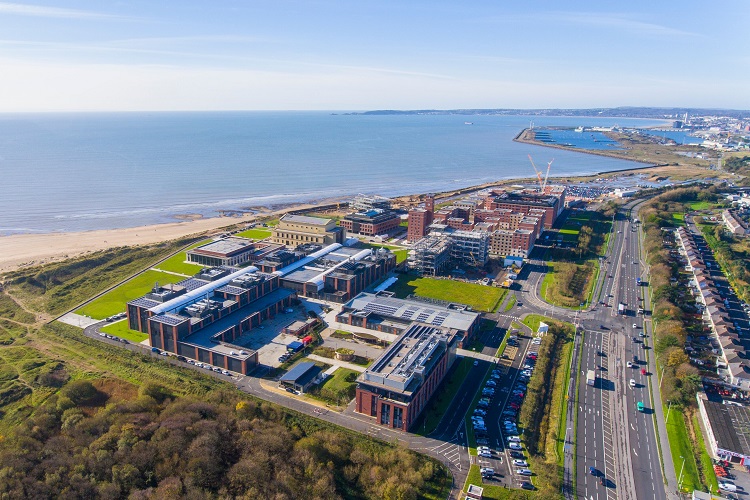
Written by;
John Jackson, Built Environment Industry Editor, Business News Wales
Throughout John’s career he has built a reputation for establishing marketing functions for a range of enterprises, ranging from leading UK retailers, to award winning Welsh business support organisations and charities.
Before Coronavirus sent society into lockdown the built environment was already entering into a period of significant change.
In the main this was being driven by environmental considerations and the need for our towns and cities to adapt to meet the changing demands of life in the 21st Century. From Rhyl to Swansea, increasingly ambitious plans for urban regeneration were being considered and implemented across Wales, and we celebrated Treorchy winning the UK High Street of the Year award. Underpinning, this drive to improve our urban centres has been the need to increase prosperity in Wales in a way that supports environmental sustainability, and pre-lockdown there was already a significant amount of work that needed to be undertaken to achieve this.

For many businesses and organisations lockdown has, and still is, a battle for survival and we can see the recession cloud heading our way, bringing with it the prospect of redundancies and business closures. Anyone who remembers previous recessions in Wales, will appreciate just how deeply they impact on everyone. The economic impact is felt on a human scale and it's one that we will want to do our utmost to minimise.
In terms of our built environment, the lockdown experience has given people time to reassess how they live, and across the media you see people commenting on: the slower pace of life, seeing nature come to life, enjoying the simpler pleasures of life, taking regular outdoor exercise, working from home and the initial tranquility that traffic free streets provided. Understandably, for others the lockdown experience has been far less bucolic. However, these changes in the way we people have lived through lockdown has provided a unique opportunity to experience living a different, more appealing way of life.
In tackling an oncoming recession, it will be important to be mindful that people’s behaviour habits may well have changed significantly. In one respect, it is a little too soon to know if the lockdown experience will result in lasting behavioral changes, although equally it does also provide an opportunity to learn from the experience and proactively make lasting changes in our built environment. This is where the opportunities for the business community are beginning to become apparent.
When one change happens in the built environment, often as not it results in a chain reaction, this is characteristic of the interconnected nature of how we live. If for example increasing numbers of people continue to work remotely, this will offer a number of benefits to employers. These include, being able to recruit from a wider talent base, improved levels of staff retention (as remote working is seen as a valuable benefit), improved business resilience (two inches of snow won’t impact operations), and the potential to downsize to smaller premises as less desk space is needed.
For employees, the regular commute becomes a thing of the past, which is good for the environment, and also gives people more free time. This in itself presents an opportunity for town centres to flourish, on the basis that if people are working from home, during their lunch break taking a walk or cycle to the shops or a cafe becomes a valuable way to get out of the house, break up the day and get some fresh air. In turn, this could see a return to shopping for food on a daily basis, and this would increase the use of local independent shops.
Towns themselves can build on this opportunity by becoming more attractive places for people to spend time in.
There are a number of simple and effective ways this can be achieved, including: planting more trees in town centres and replacing some parking spaces with parklets. A simple parklet consists of raised planters that create a defined space where seating and tables can be safely positioned. Located opposite cafes and bars they effectively create a pleasant way for people to sit outside and enjoy their food and drinks. Even an unsightly wall can be transformed with vertical planting, in essence the greener a town centre becomes, the more attractive it becomes, and as a result more people will want to spend more time and importantly more money in their local community.
Whilst this would be good for towns, for city centres it would result in fewer commuters and social visits, and there would be an increase in vacant office space. Even pre-lockdown city centres were being negatively impacted by a number of factors, in particular the growth of online shopping. There is a very real need to repurpose our cities, a good starting point would be to consider the city centre as a neighbourhood in its own right.
All good neighbourhoods need people, and the city centres in Wales are under populated. In city centres across Europe you can’t help but notice the sheer volume of apartments. It’s a way of life that allows people to live with everything they need on their doorstep, and with an increasing number of large retailers leaving our cities there is an opportunity to redevelop in our city centres. Care needs to be taken to ensure that new apartments offer the levels of space and amenities needed to enhance the quality of life for their occupants. This isn’t so much a case of a “luxury” specification, insead it’s about considered design that includes, for example; balconies, ground floor/basement storage space for bikes etc, ample storage cupboards and well proportioned room sizes. Importantly, growing the city centre neighbourhood population, will increase demand for shops, restaurants, bars and cafes in the city centres, and help to create a vibrant and sustainable future for our built environment.
Whilst we will face considerable uncertainty regarding our future, we have embarked on a direction of travel that offers opportunities across the built environment.
There will be an increased focus on all things “Re”. Reusing, recycling, repurposing and refurbishing, all of which represent new opportunities for businesses, as will the provision of services that support our commitment to combat climate change and reduce our carbon footprint. New ways of doing things created new opportunities including: modular construction, timber construction, robotics and artificial intelligence. We will be best equipped to fully embrace these opportunities by ensuring that education, training and upskilling are aligned to meet what looks set to be significant changes in our built environment.
Ultimately, in terms of the future, as we begin to move out of lockdown if we attempt to “return to normal” we may well find we are attempting to return to a way of life that was becoming increasingly unsustainable. Instead, we can use what we’ve learnt from lockdown as an opportunity to set a new direction to create a built environment that works effectively for people, business and our economy.













